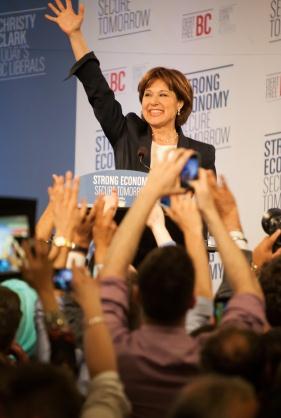While the Liberals will return to the legislature with at least 50 seats in hand, Leader Christy Clark will have to run in a by-election to obtain a seat after she lost her Vancouver-Point Grey riding to the NDP’s David Eby by 785 votes.
Clark’s loss makes it the first time since 1924 that a BC politician has become premier without winning a seat.
***
Premier Christy Clark took to the stage in triumph before a jubilant crowd of BC Liberal supporters Tuesday night.
“Well, that was easy,” she said to laughs from the crowd.
The BC Liberals won their fourth election in a row, taking a majority of the seats in the provincial legislature, defying the collective wisdom of pundits and pollsters who had predicted a massive defeat for the party.
It was a bittersweet night for Clark, as initial results had her trailing behind the NDP’s David Eby in her home riding by more than 250 votes, with 172 out of 173 ballot boxes counted. If Clark is defeated, it is expected that she would run again in a by-election in a traditionally safe Liberal riding.
As of press time, the BC Liberals had won or were leading in 51 ridings, according to preliminary results from Elections BC.
The cautious optimism seen earlier in the evening at the BC Liberals’ election headquarters at the Sheraton Wall Centre in downtown Vancouver, gave way to cheers of vindication as, one by one, local media outlets projected victory for the Clark Liberals.
The room erupted in cheers as supporters watched BC NDP leader Adrian Dix concede victory to the BC Liberals on television.
Federal Conservative Party member and former federal cabinet minister Stockwell Day high-fived a Liberal supporter on the ballroom floor of the Sheraton Wall Centre.
“Four more years, four more years,” chanted the audience during pauses in Clark’s victory speech.
“Socialism is dead!” yelled one member of the crowd.
“I recognize that many British Columbians did not vote for me or our party today, and I want them to know, as well, that I will – our team will – work just as hard for you,” she told the crowd, beaming from ear to ear.
“British Columbians will always know what I stand for. In a democracy, this is what people want and what people deserve.”
BC gay activist Ryan Clayton followed the BC election campaign and the results closely. He expressed some disappointment about the overall race in relation to the gay community.
“You saw members of [the Liberal] party very publicly make statements about homosexuality. We had Marc Dalton barely defending his comments from 10 years ago. We had Mary Polak saying to CKNW that homosexuality is a sin, in response to her campaign manager quitting. Next to none of them [stood] up to that and said, ‘You know, our party is actually a welcoming place,'” Clayton told Xtra.
Clayton is concerned that Clark has repeatedly promised to address homophobia in schools but has never followed through.
“Christy Clark’s been playing the politicking game for the last two years. Maybe now that she’s actually elected with a four-year mandate, maybe she’ll make good on the promise she’s been making,” he says, doubtfully.
Clayton holds out hope that gay allies within the Liberal caucus will eventually show some leadership to protect queer students in BC.
The NDP had promised in its election platform to introduce a provincewide standard for school codes of conduct to ensure that policies exist to “deal effectively” with homophobia and transphobia.

 Why you can trust Xtra
Why you can trust Xtra


